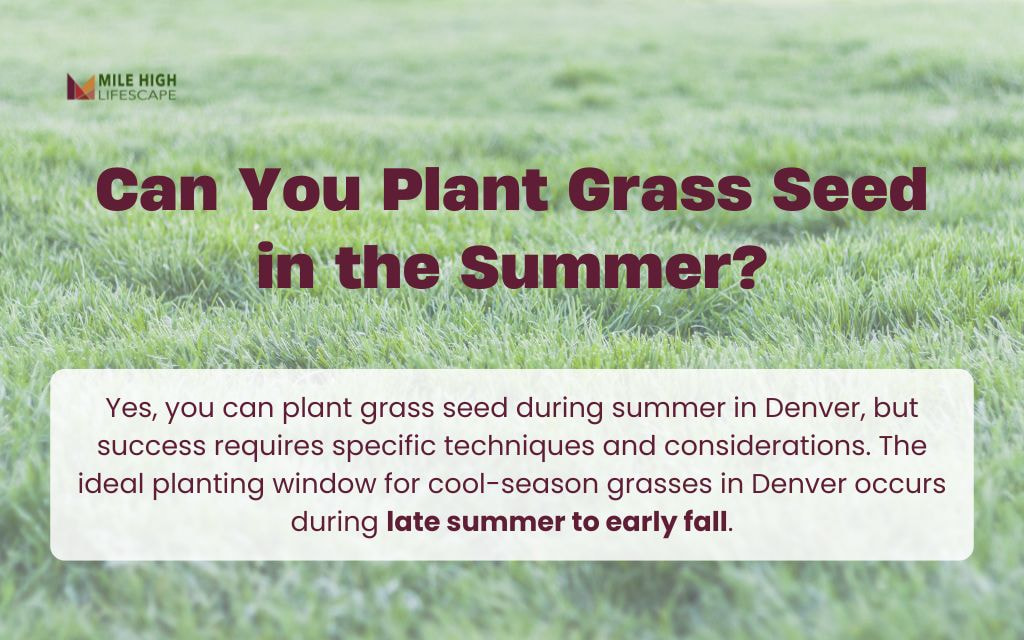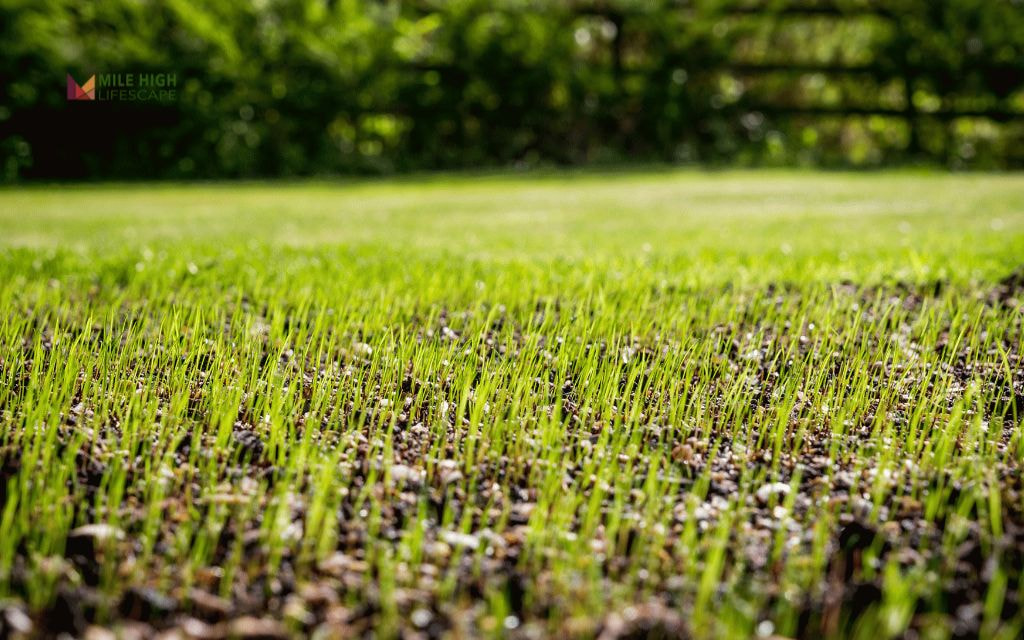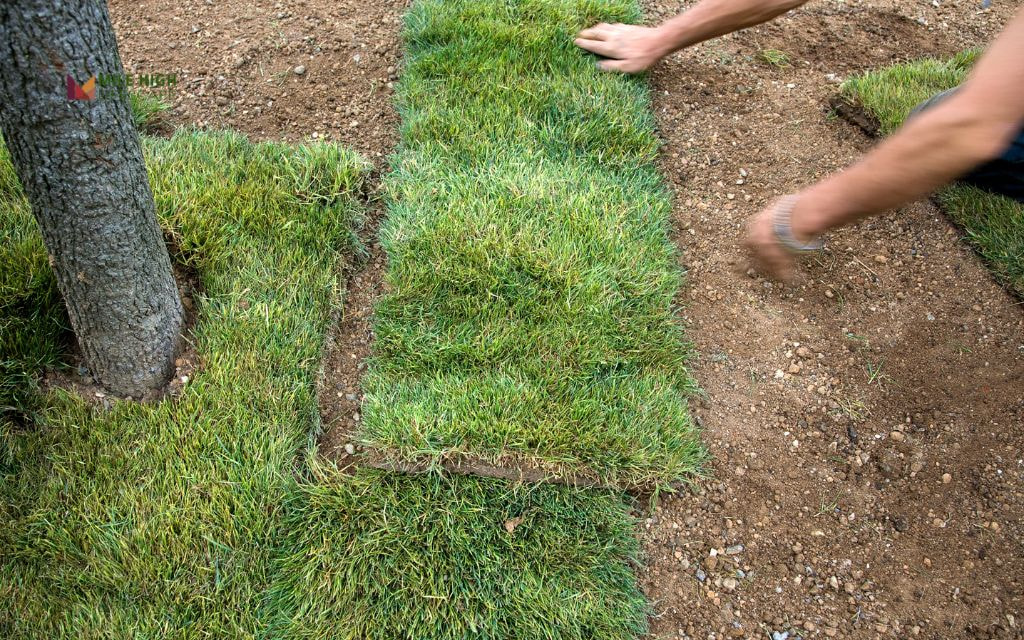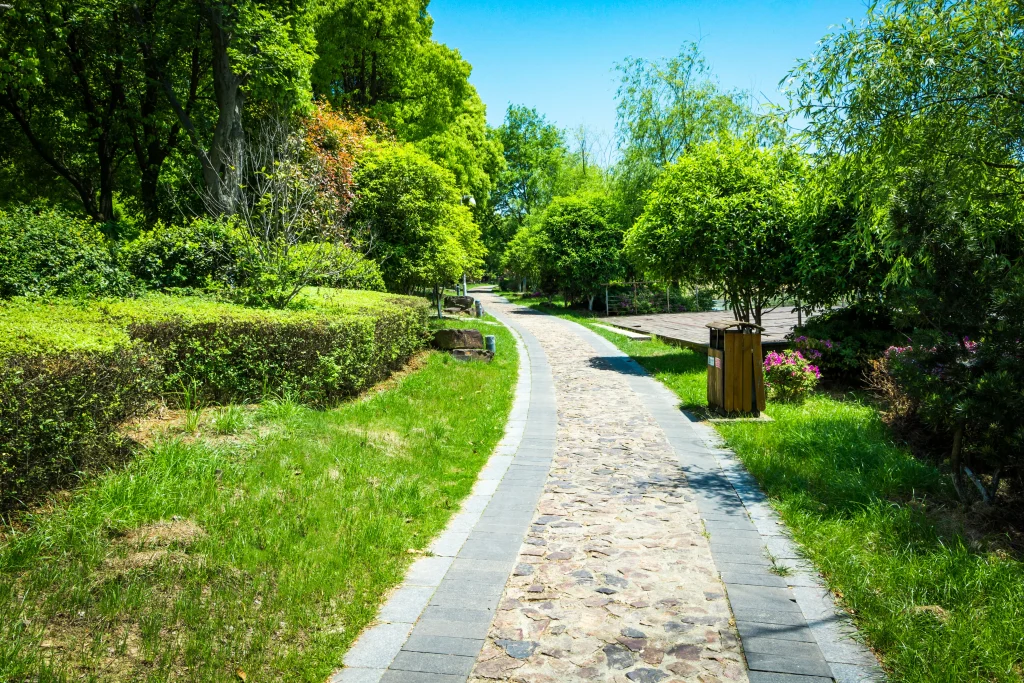The scorching Denver summer sun beating down on your patchy lawn has you wondering: Can you plant grass seed in the summer? As Denver lawn care specialists, we hear this question frequently from homeowners facing brown spots, thin patches, or establishing new lawns during the warmer months.
In this comprehensive guide, we’ll explore summer grass planting specifically for Denver’s climate, drawing on our years of experience helping Front Range homeowners achieve lush, sustainable lawns.
From selecting drought-resistant varieties to navigating water restrictions, we’ll provide you with actionable strategies to turn your summer seeding project into a success story.
Can You Plant Grass Seed in the Summer?
Yes, you can plant grass seed during summer in Denver, but success requires specific techniques and considerations. The ideal planting window for cool-season grasses in Denver occurs during late summer to early fall (mid-August through September), when temperatures moderate and soil retains more moisture.
Why is planting grass seed in the summer hard?
- Heat stress: Denver’s summer temperatures frequently exceed 90°F, causing rapid moisture evaporation. Seeds require consistent moisture for germination, and excessive heat dries out soil quickly.
- Soil temperature: Cool-season grasses struggle when soil temperatures rise above 75°F. Denver’s summer soil temperatures often reach 85°F or higher, inhibiting root development.
- Low humidity: The Front Range’s dry air accelerates moisture loss from soil and young seedlings.
- Water restrictions: Denver Water often implements conservation measures during summer months, limiting your ability to provide necessary hydration for new grass.
- High altitude sun exposure: Denver’s elevation (5,280 feet) increases UV intensity, creating additional stress for emerging seedlings.
Despite these challenges, successful summer grass planting remains possible with proper preparation, appropriate grass selection, and diligent maintenance. The key lies in understanding local conditions and implementing strategies that mitigate summer stressors.

Best Grass Varieties for Summer Planting in Denver
Selecting appropriate grass types significantly impacts your summer planting success. For most Denver lawns, we recommend a blend of these grasses rather than a single variety. Grass blends provide resilience against diverse conditions and seasonal challenges.
Tall Fescue
This variety offers excellent drought resistance and heat tolerance, making it ideal for summer planting in Denver. Its deep root system (reaching 2-3 feet) helps access soil moisture even during dry periods. Modern turf-type tall fescues provide an attractive lawn with minimal water requirements.
Kentucky Bluegrass
While preferring cooler temperatures, improved Kentucky Bluegrass varieties can establish during summer with proper care.
This grass delivers exceptional cold tolerance and creates a dense, self-repairing lawn ideal for Front Range winters. For summer planting, select drought-resistant Kentucky Bluegrass cultivars.
Perennial Ryegrass
With the fastest germination rate (5-7 days) among cool-season grasses, Perennial Ryegrass provides quick establishment during summer planting. It works well in seed blends to stabilize soil while slower-germinating varieties establish.
Fine Fescue
For partially shaded areas, Fine Fescue varieties (Creeping Red, Chewings, Hard) offer excellent drought tolerance and lower maintenance requirements. Their ability to thrive in low-sunlight conditions makes them valuable for Denver properties with mature trees.
Buffalo Grass
This native prairie grass requires minimal irrigation once established and tolerates Denver’s heat exceptionally well. While slower to establish than cool-season options, its long-term drought resistance makes it worth considering for xeriscaping projects.
Step-by-Step Guide to Planting Grass Seed in Summer
Follow these essential steps to maximize your chances of success when planting grass during Denver’s summer months:
- Test and prepare your soil: Conduct a soil test to determine pH and nutrient levels. Denver soils typically contain high alkaline content and may require amendments. Remove debris, thatch, and weeds before loosening compacted soil to a depth of 4-6 inches.
- Add organic matter: Incorporate compost or quality topsoil to improve water retention and provide nutrients. For clay-heavy soils, add 2-3 inches of organic material tilled into the top 6 inches of soil.
- Level the area: Rake the soil surface to create a smooth, even grade that slopes away from structures for proper drainage.
- Select appropriate seed: Choose a grass blend formulated for Denver’s altitude and climate conditions as detailed in the varieties section above.
- Apply seed: Use a broadcast spreader for even distribution at the rate recommended on the seed package. For most cool-season grasses, apply 6-8 pounds per 1,000 square feet.
- Incorporate seed into soil: Lightly rake the area to ensure seeds make soil contact at a depth of 1/4 inch. Avoid burying seeds too deeply.
- Apply mulch protection: Cover seeded areas with a thin layer of weed-free straw or seed-germination mat to reduce evaporation and protect seeds from the sun. Apply approximately one bale per 1,000 square feet, allowing some soil visibility through the mulch.
- Implement immediate watering: Water immediately after seeding with a fine spray to avoid seed displacement. The initial watering should moisten the soil to a depth of 1-2 inches.
- Place “new seed” signs: Mark newly seeded areas to prevent foot traffic and alert neighbors about your landscaping project.
- Monitor regularly: Check soil moisture daily, especially during hot, dry afternoons when evaporation rates peak.

Watering Techniques for Successful Summer Grass Planting
Proper watering determines the success or failure of summer grass seeding. During germination, the top inch of soil must remain consistently moist without becoming waterlogged. Denver’s low humidity and high evaporation rates require strategic watering approaches:
- Watering frequency: Water newly seeded areas 2-3 times daily with light applications during the first two weeks. Focus on morning (before 10 am) and afternoon (after 4 pm) waterings to minimize evaporation.
- Watering duration: Apply short, frequent waterings rather than lengthy sessions. Aim for 5-10 minutes per watering to maintain surface moisture without causing runoff.
- Measurement technique: Place several shallow containers (tuna cans work well) across the seeded area to measure water application. Aim for approximately 1/4 inch of water per watering session.
- Irrigation equipment: Use oscillating sprinklers or installed irrigation systems with fine spray heads. Avoid impact sprinklers that may displace seeds.
- Germination transition: Once grass reaches 1-2 inches tall (typically 2-3 weeks after seeding), reduce watering frequency while increasing duration. Water deeply (to a depth of 6 inches) every other day to encourage deep root development.
- Conservation compliance: Work within Denver Water’s restrictions by applying for a new seed establishment permit when available. These temporary permits allow additional watering for new lawns.
Remember that established grass requires about 1-1.5 inches of water weekly during Denver summers. Measure rainfall and adjust irrigation accordingly to avoid wasting water while ensuring adequate moisture.
Common Mistakes to Avoid When Planting Grass Seed in the Summer
Even experienced gardeners make these errors when attempting summer grass planting in Denver:
- Inconsistent watering: Allowing newly seeded areas to dry out even once can reduce germination rates. In dry climate, a single day of neglect might necessitate starting over.
- Planting during peak heat: Seeding during July, hottest month, decreases success rates. If summer planting proves necessary, choose early morning or evening hours and protect seeds with appropriate mulch.
- Improper seed coverage: Leaving seeds exposed to direct sunlight or burying them too deeply prevents proper germination. Seeds need soil contact but require minimal covering.
- Using generic seed blends: National brand seed mixes often contain varieties poorly suited to Denver’s altitude and climate conditions. Select seed blends formulated specifically for Colorado’s Front Range region.
- Neglecting soil preparation: Skipping soil testing and amendment leads to poor germination and weak establishment. Denver’s soils typically require organic matter addition before seeding.
- Forgetting traffic protection: Walking on newly seeded areas compacts soil and disrupts germination. Place barriers or signs to prevent foot traffic until grass establishes.
- Applying standard fertilizer: Using high-nitrogen fertilizers on new seedlings can “burn” young grass. Wait until after the first mowing before applying starter fertilizer designed for new lawns.
- Mowing too soon or too short: Allow grass to reach 3-4 inches before the first mowing, then remove only 1/3 of the blade length. Premature or aggressive mowing stresses vulnerable young grass.

What to Do If Grass Seed Doesn’t Germinate in Summer
If your summer seeding efforts produce disappointing results, implement these recovery strategies:
- Evaluate the situation: Determine whether patchy germination occurred or if seeding failed completely. For sparse areas, overseeding may resolve the issue without starting over.
- Check soil moisture: Dig a small hole in the seeded area to assess moisture at seed depth. Dry soil indicates insufficient watering as the likely cause of failure.
- Examine soil compaction: Test soil resistance with a screwdriver. Difficulty penetrating suggests compaction that prevents proper root development and water infiltration.
- Consider soil temperature: Use a soil thermometer to measure temperature at a 2-inch depth. Readings consistently above 80°F indicate heat-related germination failure.
- Plan for fall reseeding: August 15 through September 15 represents Denver’s optimal seeding window. Temperatures moderate while soil retains summer warmth, creating ideal germination conditions.
- Prepare for dormant seeding: If fall seeding proves impossible, consider dormant seeding in late November when soil temperatures prevent germination but seeds position for early spring growth.
- Consult professionals: For persistent lawn establishment problems, contact Mile High Lifescape for a property assessment. Our lawn care specialists identify specific challenges affecting your Denver property and recommend tailored solutions.
Conclusion
While summer grass planting in Denver presents challenges, implementing the strategies outlined here significantly improves success rates. Late summer (mid-August through September) offers the best window for new lawn establishment, combining warm soil with moderating air temperatures.
For homeowners seeking lush, sustainable lawns, proper timing, appropriate grass selection, and consistent care make the difference between frustration and success. Water conservation remains essential in our semi-arid climate, making established, drought-resistant lawns particularly valuable.
Mile High Lifescape provides comprehensive lawn establishment services throughout the Denver metro area. Our team understands the unique challenges of Front Range landscaping and implements proven techniques for successful grass establishment regardless of season.
Contact us for a customized assessment and plan tailored to your property’s specific conditions.
Frequently Asked Questions (FAQs)
What happens if you plant grass seed in the summer?
Planting grass seed during summer in Denver results in slower germination and requires more intensive watering. Seeds face heat stress and rapid evaporation but can succeed with proper variety selection and consistent moisture management.
How hot is too hot to plant grass seed?
Soil temperatures above 80°F significantly reduce cool-season grass germination rates. When daytime air temperatures consistently exceed 90°F, as often occurs in Denver from late June through July, grass seed germination becomes challenging.
Will grass seed germinate in 90-degree weather?
Yes, grass seed can germinate in 90-degree weather, but success rates decrease substantially. Under these conditions, warm-season grasses like Buffalo grass perform better than cool-season varieties.
Is July too late to plant grass seed?
No, July isn’t too late, but it’s far from ideal in Denver. July represents Denver’s hottest month, creating maximum stress for new seedlings. For emergency lawn repair during July, implement sun protection strategies and maintain vigilant watering schedules. Otherwise, waiting until mid-August through September yields significantly better results with less effort.
Can I just sprinkle grass seed?
Simply sprinkling grass seed without proper soil preparation dramatically reduces success rates. Seeds require soil contact for moisture absorption and root development. After sprinkling seed, lightly rake it into the top 1/4 inch of soil, then apply gentle pressure (with a roller or flat shovel) to ensure proper seed-to-soil contact. Follow with mulch application and consistent watering for best results.

